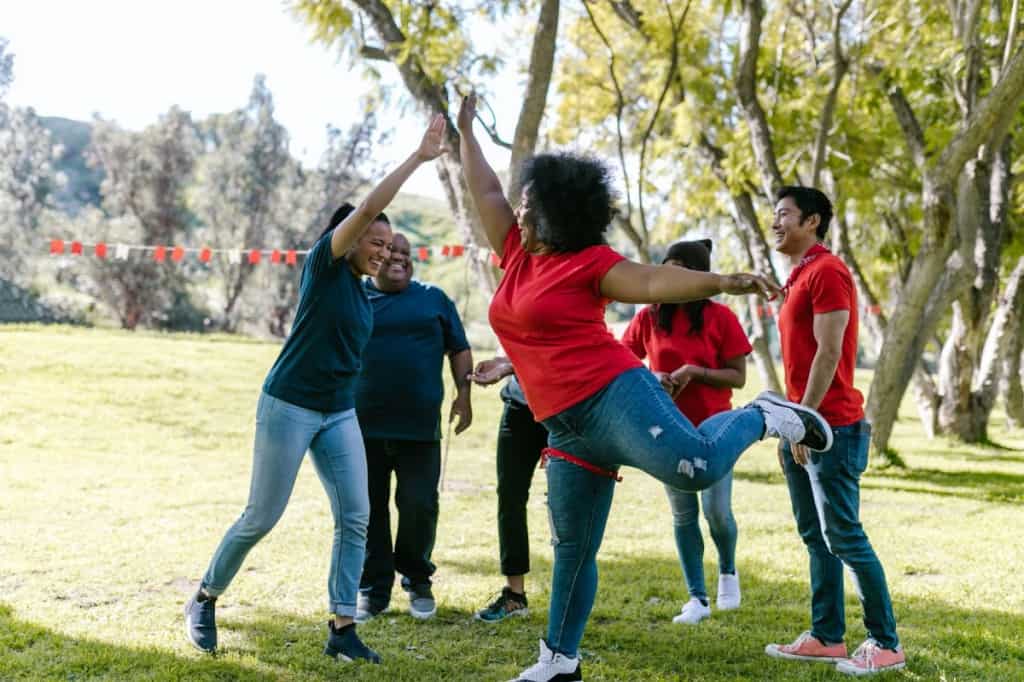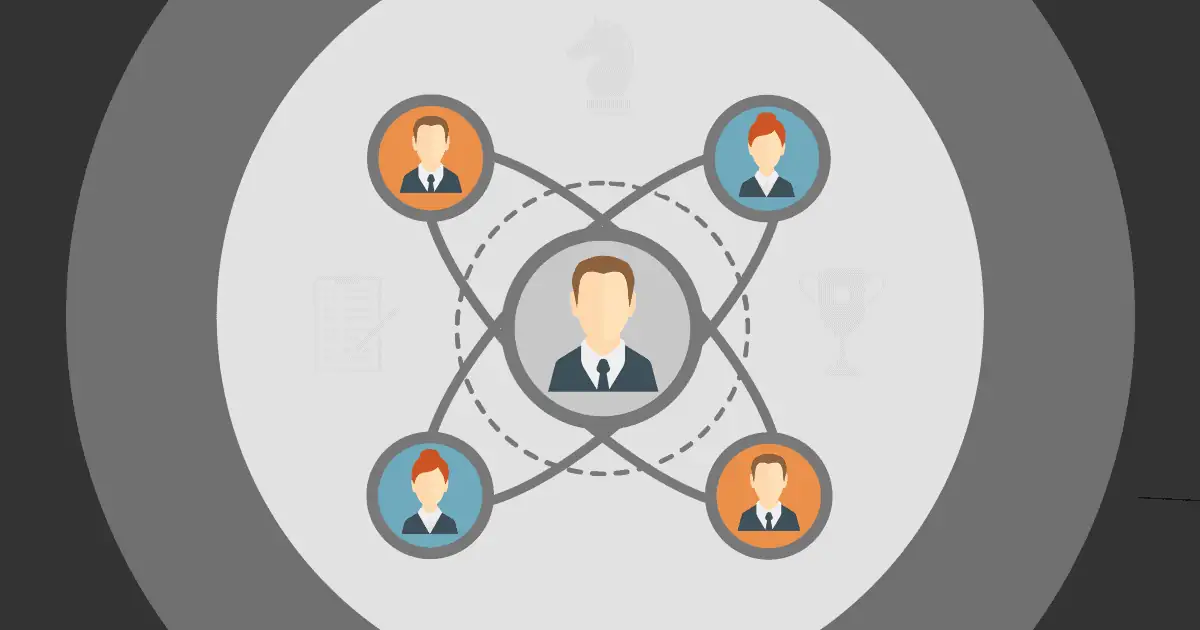What does the importance of teamwork mean to you? To be successful at work, cognitive skills are not enough; non-cognitive skills nowadays are more required by employers. These skills gradually become the new measurement of job performance. The secret of a high-performance team is teamwork.
You can develop teamwork skills from early school when you work with classmates to complete assignments. And when you are in the workplace, effective teamwork even becomes more critical, which accounts for at least 50% of project success. Employees need to realize the importance of teamwork in the company and remaining effective collaboration is essential for improving productivity.
Thus, understanding the essence of teamwork, its importance, and both positive and negative examples can help business deal with bad teamwork employees and improve collaboration in their business.
Table of Contents
- Overview
- The Importance of Teamwork: 5 Benefits of Effective Teamwork
- Bad Teamwork You Should Avoid: 6 Examples
- Tips to Improve Teamwork Skills
- 8 Teamwork Skills to Master
- The Bottom Line
- Frequently Asked Questions
Overview
| Is it teamwork or team work? | Teamwork |
| When did teamwork start? | Between the 1920s and 1930s |
| Who coined “teamwork makes the dream work”? | John C. Maxwell |

More Engagement Tips with AhaSlides
- Employability skills
- Timeboxing techniques & examples
- Benefits of remote working

Looking for an engagement tool at work?
Gather your mate by a fun quiz on AhaSlides. Sign up to take free quiz from AhaSlides template library!
🚀 Grab Free Quiz☁️
The Importance of Teamwork: 5 Benefits of Effective Teamwork
Why is teamwork important in the workplace? Great teamwork can bring many benefits to both individuals and organizations. It is also the reason why businesses try to improve teamwork skills within teams and companies.
#1. Reduce Workplace Conflict - The importance of teamwork
Conflicts often happen in an unhealthy competitive workplace, as teammates receive unequal treatment and interests. In the workplace, there are common to see task conflicts, relationship conflicts, and value conflicts. In particular, task conflicts refer to disagreement in opinions and actions when different team members have different perspectives and backgrounds. When doing good teamwork, they can stay together to solve problems, find effective solutions for conflicts, and reconnect with team members. Forbes indicates that preventing all conflicts can help teams quickly grow and reach their full potential.
#2. Encourage Innovation and Creativity - The importance of teamwork
When doing teamwork brainstorming and team bonding activities, employees are easier to get inspired. As other teammates are willing to listen and support others' opinions and thoughts, they can be free to think out of the box and speak out their ideas. When an individual comes up with an idea, another team member might show their straight and reasonable criticism and advice while working together to bring these ideas to life, which drives innovations and breakthroughs.
#3. Maintain a Positive Workplace - The importance of teamwork
Teamwork is important as good teamwork makes happier employees and remains a positive work environment all the time. Teamwork can prevent free riders, misunderstandings, and unnecessary arguments. Even after a hard quarrel, members can understand each other better. A good team member might share their willingness to help cover work or give instruction to other teammates when they are inexperienced in new situations or have to deal with personal emergencies.
#4. Boost Personal and Organizational growth - The importance of teamwork
In a high-performing team, you will raise opportunities to learn from experts or experienced seniors. When there is a person in your team are self-discipline, good time management, and attention to detail, you will be able to learn these good team player skills and master them and help you to improve your knowledge, have higher job performance, better decisions, and result in higher promotion. A company with many high-performing teams is a thriving company, they are the main factor that accounts for the company's success in the market, getting a better reputation and attracting more talent.
#5. Lessen Anxiety and Burnout - The importance of teamwork
Why is teamwork important in the workplace? The benefits of teamwork are also shown in reducing anxiety and burnout among employees. The efficacy of teamwork means that they usually meet the deadline, generate the best results, and avoid errors and mistakes. All the team is responsible and accountable for their duty, so they are less likely to get overworked, or have free riders. They can be less nervous and frustrated when they know that they can get a full backup from your reliable team when they are in a tough situation.
Bad Teamwork To Avoid: 6 Examples
Have you ever wondered why your team doesn't work? You have many talents in your teams, but when it comes to teamwork, they seem reluctant to collaborate with others or better work independently. There might be reasons that lie behind them. Here are 5 examples of bad teamwork that might help you to check your collaboration level in your team:

- Focusing On Results Only
Many leaders don't realize the importance of teamwork. They are likely to keep their eyes on results and ignore how their team works together to generate the outcomes. It is good for a team to set a goal but don't care how your team performs a task, dividing workload unfairly, and unstable team regulations and culture are some of the reasons leading to team conflicts and team incoherence.
- Lack of Trust
One of the typical examples of poor teamwork is the lack of trust. A team without trust is not a good team. When team players lost their trust in anyone on their team is a team and organizational misfortune. Lack of belief refers to the condition of employees who keep scepticism about the business or their coworkers and don't find anyone reliable enough to get tasks done together. They are more likely to get tension and burnout when they try to bite off more than they can chew. And in the long term, it can lead to high staff retention and low staff turnover rates.
- Lack of Accountability
Free riding happens all the time even the most effective team has a free rider. They are employees that contribute so little to group work. What a leader can do is try to prevent people with a lack of responsible and accountable feel in their team. Productive employees will be affected and lose their inspiration and motivation to work hard and improve themselves as they see other free riders with similar rewards as them.
- Negative competitiveness
Among many reasons that might destroy your team, a leader can consider preventing harmful competition. Competition is good to make people improve. Each team member will try their best to get recognition and rewards for or their excellent performance. But when it is going too far, many employees try to place dirty tricks to harm other employees or show off their knowledge and talents without consideration can eliminate a sense of teamwork and team cohesion.
- Egos
When employees ignore the importance of teamwork, they seem to put their egos first and are likely stubborn to listen to others' advice. They believe in themselves and are less willing to learn new things. They won't want to communicate with their team and just focus on forcing others to follow them. At the same time, there are specific team players who are consistently placing blame on others. This is one of the most poor teamwork examples and can make other teammates annoyed and irritated.
- Poor Communication
A common phenomenon in teamwork recently is poor communication, especially regarding virtual teams. More and more people are lazy to communicate and interact with their teammates. A lack of effective communication can cause a variety of problems such as forgotten tasks, duplicate work, errors, tensions to rise, missed deadlines, wrong assumptions, and beyond.
Tips to Improve Teamwork Skills -The Importance of Teamwork
If you have heard about teamwork's five C's, which stand for communication, camaraderie, commitment, confidence, and coachability, you might find it helpful in the process of planning an effective teamwork strategy. You can combine these concepts and the following tips to improve teamwork within your team and workplace.

- Clarify team rules and personal duties
It is important for a team to set up clear team rules, and policies before start working with each other. Introductory meetings can be a good idea for newly founded teams or for newcomers so that they can soon align with team goals and be responsible for their roles. When every adapts to working with others, they can feel free to share their ideas and commit to the team and organization in the long term.
- Increase Team-building activities
So what are the best team-building activities to get people to realize the importance of teamwork? When it comes to setting up team-building activities, there are 5 main types involving meeting kickoff, communication, problem-solving, brainstorming, and employee bonding. Depending on the goal setting of each event, you might design appropriate activities. You can think of hosting icebreakers and live polls to start a meeting. You can customize a trivia quiz to challenge how much each team member knows about the other. Or running an incentive trip to a famous beach or camping area to reward your team, at the same time giving them a chance to interact and structure bonding with their teammates.
- Apply high-tech tools
In the digital era, don't forget to upgrade your team with high-tech software to improve productivity and lessen employees 'workload. Nowadays, there are more organizations that prefer hybrid work models, and using suitable virtual conference platforms and presentation tool is beneficial. AhaSlides properly an ideal tool for you to customize a successful and engaging presentation. You can quickly edit the live polls, interactive quizzes, and games in real-time to surprise your team and organization. For example, you can set up a Spinner Wheel to randomly call out the participant names in your game of Get-to-know your team trivia quiz.

8 Teamwork Skills to Master -The Importance of Teamwork
#1 - Communication
Be it a boardroom or a classroom - effective communication is the key to success. You must be able to communicate and convey the necessary info, so there's no room for doubt, whether it's in person, via meeting workspaces, or via emails and phones.
Communication includes both verbal and non-verbal cues. Verbal communication includes your point of view, your words and the confidence and clarity with which you use those words, and the tone of voice that you use to put your point across.
Non-verbal communication is how you react when others speak. Your body language, facial expressions (the eye-roll, the deep sighs), attention level (this includes your attention span or the times when you zone out), and eye contact (whether you are shifting, maintaining normal eye contact, or playing a staring game) are all examples of non-verbal communication.
#2 - Collaboration
Teamwork Skills
Collaboration skills give the ability for people and teams to work well with each other to achieve a common goal. In the current scenario, it means, along with good communication skills, you need to be an active listener, be responsible, understand the tasks and steps involved, be empathetic, and acknowledge the personal goals, challenges, and diversity of your colleagues.
For example, allow your team members to present their POV for a positive collaborative environment. If you don’t understand, ask for clarification, and summarise it to show that you are on the same page before moving forward. Look out if a team member is irritable or quiet and doesn’t appear their usual self; maybe they need someone to talk to. With people coming from different backgrounds, there might be instances where a colleague is constantly ignored or talked over during meetings.
Make a deliberate effort to bring the discussion back to that person and create an open environment. These are just a few ways to use your collaboration skills and make a successful team.
#3 - Active Listening
Though active listening is a part of non-verbal communication, it is one of the most important teamwork skills, and it deserves a special mention of its own. If you are a skilled active listener, you will not only pay attention to what the speaker is saying out loud; but you’ll also be able to understand the unsaid message. As an active listener, you listen without judgement and understand where your teammates are coming from as they share their ideas, viewpoints, and feelings on a particular topic.
For example, while working on a project, the majority of the team might agree on a set number of project milestones. A few dissenting voices might have valid concerns, but they get shut down. You, as a team leader, or even as a supportive colleague, can bring back the conversation where their POVs are encouraged and discussed with an open and non-judgmental mindset.
#4 - Consciousness
In teamwork, you need always to be conscious of the team's dynamics. This consciousness comes from knowing your team members' personalities, which is not always something you will get straight away, but something that builds over time.
Once you have figured out who is who in the team, it's easier to navigate how and when you are going to voice yourself or help others voice themselves.
For example, suppose you know a team member is shy and has had ideas shot down before. In that case, you'll likely come across situations where they will be uncomfortable in presenting their ideas publicly. Don't forget them. You can ask them to submit their ideas privately with you, which you can promise them will happen without judgement.
One other way is to use interactive engagement software. Free platforms like AhaSlides can allow everyone to submit their ideas anonymously from anywhere, meaning they feel more encouraged to share their thoughts.
Try AhaSlides for free! - Important of Team Work
#5 - Conflict Management
Let’s accept it, conflicts within teams are common and unavoidable. But what happens next can make or break a team, and by extension, the organisation. That is why, expert conflict management skills are always in demand.
A team is made up of diverse people. People with different backgrounds, behaviours, life experiences, personalities, ethos, and professional and personal goals. As such, it is common for people not to share a similar point-of-view at all stages of a campaign or a project.
It's the leader's responsibility to dive deep into their conflict management skillset and build a consensus among everyone. You have to take the role of the negotiator, provide constructive feedback and resolve differences among your teammates. And at the end, they should accept the team’s decision with a happy heart.
#6 - Accountability
Whether you are a team leader or a team member, you must be accountable for your actions and decisions. You must be reliable and responsible so that your colleagues can trust you – be it with their personal information, or any sensitive info related to the company.
There might be instances where you need to make quick decisions to solve complex issues, such as unforeseen roadblocks that might delay your project, or dealing with a fellow coworker for pulling their team down. These are unwanted situations where you, as a team, must find the source of these issues, understand the ‘why’ and ‘how’ of these delays, and act accordingly. Your sense of responsibility and accountability would encourage your team to make an effort and work together towards a high standard of work quality and work ethics.
#7 - Conviction
It is not right to hope that a team or an organization will always have good days. There will be setbacks, rejections, unexpected roadblocks, project delays, and even personal losses that might hamper a company's growth. During these times, you must muster a sense of conviction and approach tough times with a growth mindset. Simply put, you need to reinforce the belief that ‘you can do it’ within your team and move forward with hard work and persistence.
Understand that you have a choice to let this setback define you or focus on learning and finding new ways to solve challenges. For example, if your new website has not received the applause that you expected, analyse its flaws. Find out what is wrong with it, learn from it, and build a newer improved version of it. Or, if you’ve realized that the hiring strategy isn’t working to your company’s satisfaction, do not let that strategy influence you any further while you build another strategy from scratch.
#8 - Compassion
Compassion is probably the most underrated skill set of a team member. And yet, in the current economic scenario, it is the highest value addition to an organization. Compassion enables you to look beyond the surface. It opens you to a better understanding of your colleagues’ motives and feelings and motivates you to take purposeful action.
Compassion is in fact one step further than empathy, where you not only feel what the other person is feeling but also take steps to lessen that negative force of emotions. You listen to them, understand where they are coming from, put yourself in their shoes, and create an appropriate response for the situation. You might need to be compassionate anywhere – in team sessions, one-to-one interviews, virtual sessions, or emails.
Once you can transfer this skill to each team member, it can do wonders for their confidence and how they react to similar situations later in life. The above-mentioned teamwork skills are not just meant for the workplace. You can use them in the classroom, during group brainstorms, and even in the theatre. The key is to keep on practising. Watch how they make a difference the next time you incorporate them into your daily sessions.
The Bottom Line
The power of teamwork is undeniable, as you can see the importance of teamwork. Now that you understand the importance of teamwork, the key to unlocking high-performance teams in any work in any industry.
Bear in mind that today’s teams are different from the teams of the past, they are more diverse, dynamic, high-demand, and tech-savvy. Don't let them down with minor mistakes in leadership and teamwork.
Unlock AhaSlides features for free to explore a noble way to improve teamwork and team bonding.
Frequently Asked Questions:
What is the most important thing about teamwork?
Communication is the most crucial element of teamwork, as it helps team members update others’ processes, make an effective strategy together and avoid misunderstanding while working.
Why is teamwork valuable?
A strong sense of teamwork can offer individuals opportunities to share their ideas confidently, be ready to collaborate and enhance positive relationships in the team. Therefore, your team might achieve the shared goals swiftly.
What are the benefits of teamwork?
There are 5 main benefits of teamwork:
1. Reduce workplace conflict
2. Encourage innovation and creativity
3. Maintain a positive workplace
4. Boost personal and organizational growth
5. Lessen anxiety and burnout








